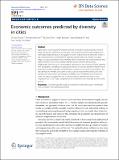Economic outcomes predicted by diversity in cities
Author(s)
Chong, Shi K; Bahrami, Mohsen; Chen, Hao; Balcisoy, Selim; Bozkaya, Burcin; Pentland, Alex ‘; ... Show more Show less
Download13688_2020_Article_234.pdf (1.687Mb)
Publisher with Creative Commons License
Publisher with Creative Commons License
Creative Commons Attribution
Terms of use
Metadata
Show full item recordAbstract
Abstract
Much recent work has illuminated the growth, innovation, and prosperity of entire cities, but there is relatively less evidence concerning the growth and prosperity of individual neighborhoods. In this paper we show that diversity of amenities within a city neighborhood, computed from openly available points of interest on digital maps, accurately predicts human mobility (“flows”) between city neighborhoods and that these flows accurately predict neighborhood economic productivity. Additionally, the diversity of consumption behaviour or the diversity of flows together with geographic centrality and population density accurately predicts neighborhood economic growth, even after controlling for standard factors such as population, etc. We develop our models using geo-located purchase data from Istanbul, and then validate the relationships using openly available data from Beijing and several U.S. cities. Our results suggest that the diversity of goods and services within a city neighborhood is the largest single factor driving both human mobility and economic growth.
Date issued
2020-06-24Department
MIT Connection Science (Research institute); Massachusetts Institute of Technology. Institute for Data, Systems, and Society; Massachusetts Institute of Technology. Media LaboratoryPublisher
Springer Berlin Heidelberg
Citation
EPJ Data Science. 2020 Jun 24;9(1):17
Version: Final published version